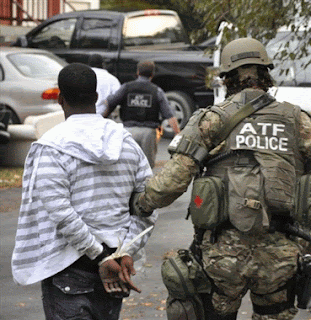
Wed, Sep 24, 2014
2:00pm - 3:00pm
Hazel B. Kerper Courtroom
 With the rash of armed robberies of cell phone stores and pawn shops in the Houston area, ATF Special Agent Alex Johny is assigned to a task force to catch the criminals behind those serial attacks.
With the rash of armed robberies of cell phone stores and pawn shops in the Houston area, ATF Special Agent Alex Johny is assigned to a task force to catch the criminals behind those serial attacks.
An agent for the Bureau of Alcohol, Tobacco, Firearms and Explosives (ATF), Johny has been assigned to the gun group for the last six years, targeting convicted felons, illegal aliens, gangs and other organized groups with firearms. Using confidential informants or undercover buys, Johny investigates guns used in crimes or the individuals that cannot legally possess them.
“Unlike other crimes, like drugs, it is not illegal for everyone to possess guns,” said Johny. “In fact, it is a legal transaction for most people. But it is illegal if you are a convicted felon, if you are an illegal immigrant, if you are dishonorably discharged from the military, or otherwise prohibited.”
 Johny investigates cases by doing his homework, trying to identify perpetrators by working with confidential informants, street names or nicknames.Once he identifies a suspect, he has to verify that, in fact, it is illegal for that individual to possess a gun. For example, some offenders charged with felony cases plead out to lesser crimes that do not restrict gun ownership.
Johny investigates cases by doing his homework, trying to identify perpetrators by working with confidential informants, street names or nicknames.Once he identifies a suspect, he has to verify that, in fact, it is illegal for that individual to possess a gun. For example, some offenders charged with felony cases plead out to lesser crimes that do not restrict gun ownership.
Once an identification is made and a felony conviction is confirmed, ATF generally sets up a “buy” on the streets. These operations take significant planning, including surveillance work, operations and rescue contingencies for agents in case the deal goes south.
“Even when you have a plan, you have to adapt and overcome the situation,” said Johny. “You have to use your instincts.”
 In addition to catching offenders, ATF agents are responsible for preparing the case for prosecution as well as the administrative duties of forfeiting and destroying weapons. If a gun was stolen, they are also charged with getting it back to the rightful owner.
In addition to catching offenders, ATF agents are responsible for preparing the case for prosecution as well as the administrative duties of forfeiting and destroying weapons. If a gun was stolen, they are also charged with getting it back to the rightful owner.
“I love the uniqueness (of each case),” said Johny. “You never know what is going to happen on any given day.”
Like the time he caught a Liberty County Police Captain, who was convicted of committing mail fraud and stealing ammunition from the Cleveland Police Department’s evidence room. The case involved 500 guns that went missing from police custody.
The jury found the former evidence room technician guilty of converting ammunition given to the police department for his own use, which was then either exchanged to purchase 86 new weapons or sold to customers of his private business. He also used department letterhead to purchase training pistols which were instead given to the owner of a local gun shop.
 While Johny concentrates on guns, the mission of the ATF goes well beyond firearms. The federal agency is charged with protecting communities from violent criminals and organizations involved in the use and trafficking of illegal fireworks; the illegal use and storage of explosives; acts of arson, bombing or domestic terrorism; and the illegal diversion of alcohol and tobacco products.
While Johny concentrates on guns, the mission of the ATF goes well beyond firearms. The federal agency is charged with protecting communities from violent criminals and organizations involved in the use and trafficking of illegal fireworks; the illegal use and storage of explosives; acts of arson, bombing or domestic terrorism; and the illegal diversion of alcohol and tobacco products.
Before joining ATF, Johny worked as a parole officer in Harris County for the Texas Department of Criminal Justice, Parole Division, and as a patrol officer for the Houston Police Department. With a caseload of 60-70 defendants, the parole office taught him time management, priorities and organization skills. He credit the Houston Police Department with teaching him to be a police officer.
“The Houston Police Department taught me to be a police officer,” said Johny. “At the end of the day, it taught me the bread and butter of police work.”
For students interested in pursuing a career in a federal agency, Johny recommends “staying out of trouble, completing your college education and getting some real life work experience.”
“Get real life experience, whether it is in the military or a police department,” he said. “You are better able to handle things if you have a well-rounded education, a good skill set and real life experience.”